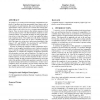Free Online Productivity Tools
i2Speak
i2Symbol
i2OCR
iTex2Img
iWeb2Print
iWeb2Shot
i2Type
iPdf2Split
iPdf2Merge
i2Bopomofo
i2Arabic
i2Style
i2Image
i2PDF
iLatex2Rtf
Sci2ools
111
click to vote
STOC
2010
ACM
2010
ACM
Complexity Theory for Operators in Analysis
We propose a new framework for discussing computational complexity of problems involving uncountably many objects, such as real numbers, sets and functions, that can be represented only by approximation. The key idea is to use a certain class of string functions, which we call regular functions, as names representing these objects. These are more expressive than infinite sequences, which served as names in prior work that formulated complexity in more restricted settings. An important advantage of using regular functions is that we can define their size in the way inspired by highertype complexity theory. This enables us to talk about computation on regular functions whose time or space is bounded polynomially in the input size, giving rise to more general analogues of the classes P, NP, and PSPACE. We also define NP- and PSPACEcompleteness under suitable many-one reductions. Because our framework separates machine computation and semantics, it can be applied to problems on sets of...
Related Content
| Added | 17 Jul 2010 |
| Updated | 17 Jul 2010 |
| Type | Conference |
| Year | 2010 |
| Where | STOC |
| Authors | Akitoshi Kawamura and Stephen Cook |
Comments (0)

